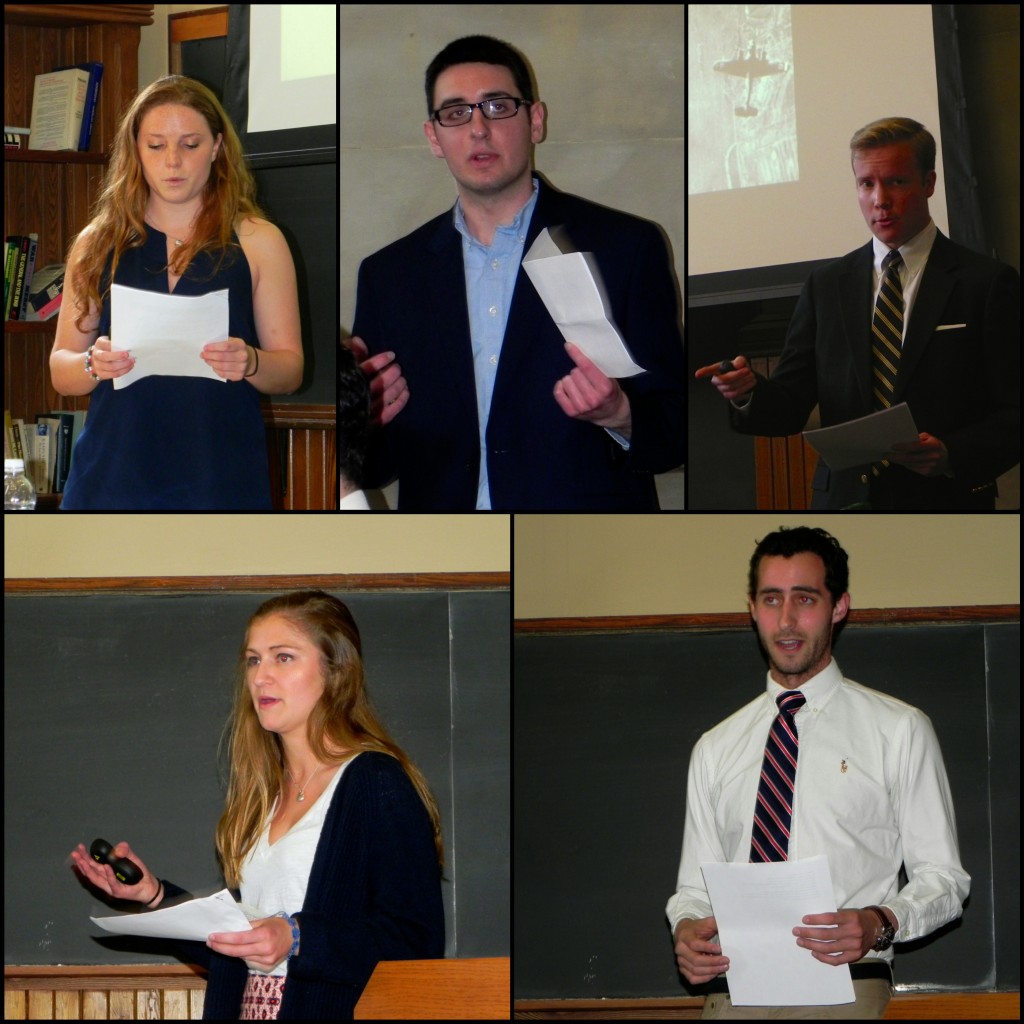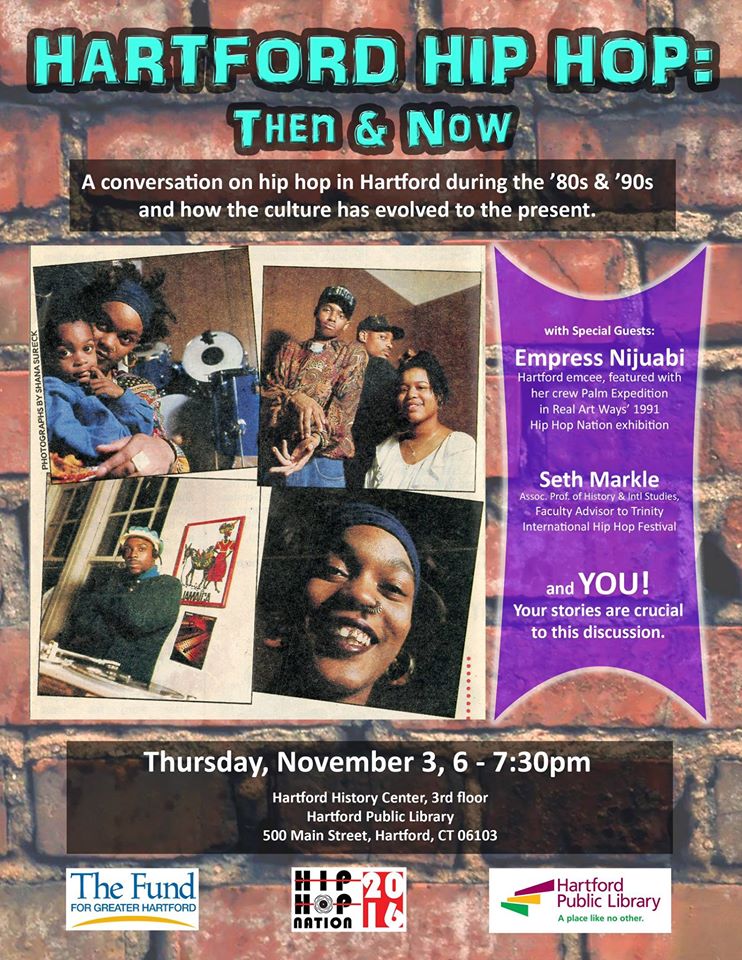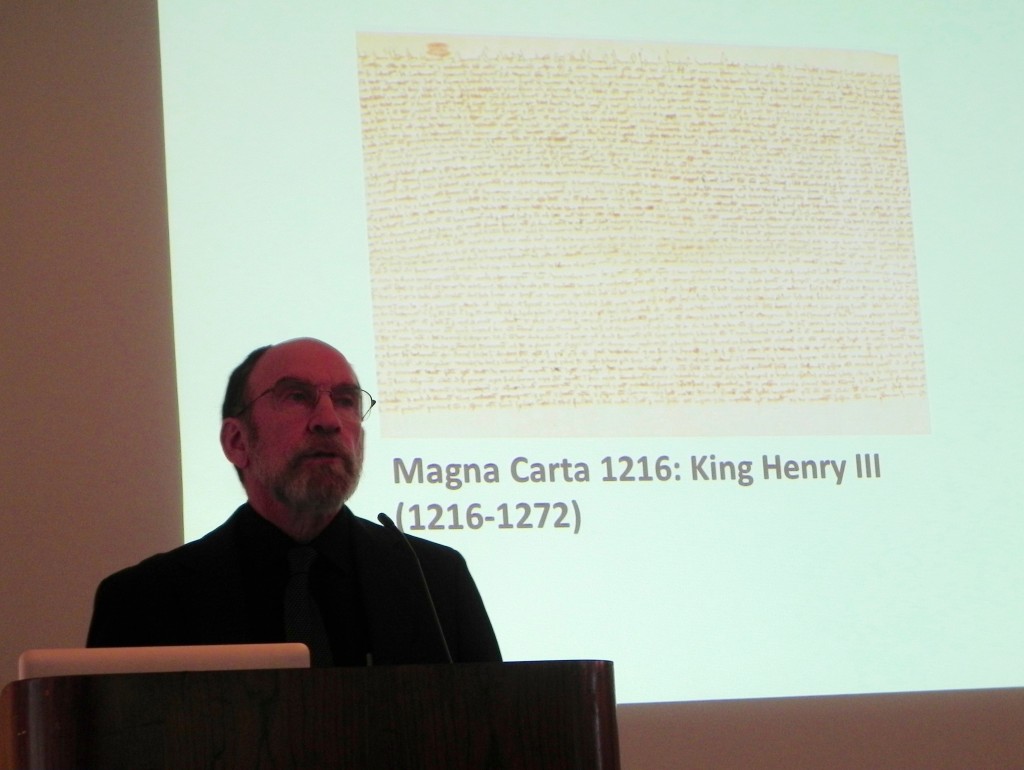“Hartford Hip Hop: Then and Now”
A Conversation on hip hop in Hartford during the 1980s-1990s and how the culture has evolved to the present featuring Empress Nijuabi, a Hartford based emcee who was a member of the pioneering hip hop group Palm Expedition and Seth Markle, Associate Professor and Faculty Advisor to the Trinity International Hip Hop Festival.
When: Thursday, November 3rd, 6-7:30pm
Where: Hartford History Center, Hartford Public Library (downtown)
Free and open to the public.
“Headstrong”: A Photo Exhibit on the Haitian Diaspora in Hartford
By Sara Kippur, Associate Professor, Language and Culture Studies
As part of my first-year seminar course on “Francophone Hartford,” and with the immense help and guidance of Professor Pablo Delano (Studio Arts) a photo exhibition and reception was held on October 20th for Haitian photographer Marc-Yves Régis’s work. Marc is a Haitian-born Hartford resident whose photos about Haiti’s economic and social burdens resonate powerfully today.The opening reception for the exhibition was held at Trinity’s Broad Street Gallery (1283 Broad St.), and Marc was there to talk about his work. History major, Seth Browner, attended and helped organize this event while serving as my first-year seminar mentor/teaching assistant. This exhibit can be viewed until November 7 via appointment only. (contact. sara.kippur@trincoll.edu). Photographs by Pablo Delano.
“Warsaw Ghetto’s Secret Archive Goes Hollywood”
“By the time Serena Kassow appeared in a film about the Warsaw ghetto’s secret archive, she had heard about “the most important untold story of the Holocaust” for the better part of her life. As the daughter of Holocaust historian Samuel Kassow, the 21 year old grew up watching her father collect stories from local survivors in Connecticut, particularly those from Poland. Years of learning culminated in May, when Kassow joined her father on the set of “Who Will Write Our History?” a documentary based on his book about the Warsaw ghetto’s “Oneg Shabbat” archive. The day after receiving her theater studies degree from Boston’s Emerson College, Kassow flew to Poland for what she called “an incredibly personal month.” Having heard she was a theater student, the film’s producers cast Kassow as a featured extra. On ghetto sets in Warsaw and Lodz, she portrayed a typist preparing reports for the clandestine archive, from which 25,000 documents have come down to history.”
Read entire article here:
The Annual Philip C.F. Bankwitz Lecture: Money, History and the French Revolution
On Thursday, November 3, 4:30pm (Reese Room, Smith House): The History Department will be sponsoring its annual Philip C.F. Bankwitz Lecture titled, “Money, History and the French Revolution” featuring Rebecca Spang is Professor of History and Director of the Center for EighteenthCentury Studies at Indiana University. Her first book, The Invention of the Restaurant: Paris and Modern Gastronomic Culture, has been translated into Japanese, Portuguese, Turkish, and Modern Greek. It was the recipient of two major prizes, the Gottschalk Prize for the best book in eighteenth-century studies, awarded by the American Society for Eighteenth-Century Studies, and theThomas J. Wilson Memorial Prize for best first book, awarded by the Harvard University Press.
Her most recent research is on the subject of money. Stuff and Money in the Time of the French Revolution, published by Harvard University Press in 2015, uses one of the most infamous examples of monetary innovation — the assignats — to write a new history of money and a new history of the French Revolution. It shows that revolutionary radicalization was driven by the ever-widening gap between political ideals and the experience of daily life and restores economics, in the broadest sense, to its rightful place at the heart of the Revolution (and hence of modern politics).
J-Term in Paris: HIST 237: The History of French Wine
This course introduces students to the history of French wine. Students will gain a critical, contextualised understanding of how French wine has evolved over the past three centuries and how it has made its mark on French culture, society and politics. This intensive course incorporates the city of Paris experientially. Classes will be divided into short taught sections, in-depth discussions of primary and secondary literature, and three excursions: a professional wine tasting emphasising regional differences in France and the concept of terroir; a visit to a working vineyard to highlight the technical and spatial aspects of wine production; and a visit to a wine museum to explore the evolution of wine through material culture. Fee: $250.
Instructor: Jennifer Reagan-Lefebvre, PhD, is Associate Professor of History at Trinity College, where she teaches British history and a popular course on global wine history. She previously taught at the University of Cambridge and the American University of Paris. She is the author of Cosmopolitan Nationalism in the Victorian Empire (2009) and is writing a history of the wine trade. In 2016 she was honored with Trinity’s Hughes Award for Achievement in Teaching. Contact: jennifer.reganlefebvre@trincoll.edu
J-Term classes are $1,500. Additional fees apply.
History Professor Receives Prestigious Teaching Award

It is becoming apparent that the Trinity History Department is an incubator of teaching talent. At the 2016 Trinity College Graduation Ceremony held this past May, another historian (3 in 11 years) was honored. Jennifer M. Regan-Lefebvre, Assistant Professor of History, received the Dean Arthur H. Hughes Award for Achievement in Teaching, an award that recognizes excellence in teaching by junior members of the Faculty.
Congratulations!
Mead Lecture & Student Reactions
On Tuesday, October 20th, Dr. Stephen D. White, Candler Professor Emeritus of Medieval History at Emory University and Visiting Professor at Harvard University delivered the History Department’s annual George J. Mead (Class of 1937) Lecture: “Magna Carta: How a Total Failure Became “the Greatest Constitutional Document of All Times.”
The Mead Lecture in History, established by a bequest in 1952, is Trinity’s most prestigious endowed annual lecture. Previous lecturers have included James McPherson, Philip Curtin, Alan Samuel, and E. P. Thompson. The fund was established in honor of George Jackson Mead of Bloomfield, Connecticut. He graduated from Choate preparatory school and the Massachusetts Institute of Technology.
Mr. Mead was a founding partner in the Pratt & Whitney Aircraft Company and the designer of its Wasp engine, whose widespread use and reliability transformed military and commercial aviation in the U.S. He later served as an advisor to President Franklin D. Roosevelt, guiding wartime aircraft production throughout the nation, and was awarded the President’s Medal of Merit in 1948. His intent was that the Mead Fund support lectures, prizes, and other programs to stimulate the study of government, economics, and history, in order to better prepare students for government service. Mr. Mead received an honorary doctorate from Trinity College in 1937.
Senior Thesis Presentations, Class of 2015

On Thursday, April 30, 2015, the history thesis writers presented their research findings to the department and other guests. For more than a year, five students have been researching and writing and, in the process, forging bonds of friendship among each other and mentorship relationships with history professors. Their research projects explored a variety of themes, and served as critical interventions in the study of American slavery, Nazism and the Third Reich, Mediterranean city-state formations, the U.S. and World War II, and international travel and literary production.
The names of the students, the titles of their projects, and the names of their advisors are as follows:
Tyler Green, “A Connecticut Yankee in London: Mark Twain’s Rise fromd Humble American Humorist to Literary Great”
Thesis Advisors: Profs. Lefebvre & Hedrick
Duncan Grimm, “Forging an Alliance of Purpose: John Gilbert Winant, Edward Roscoe Murrow, and Creating an Anglo-American Worldview”
Thesis Advisors: Profs. Regan-Lefebvre & Hedrick
(more…)








